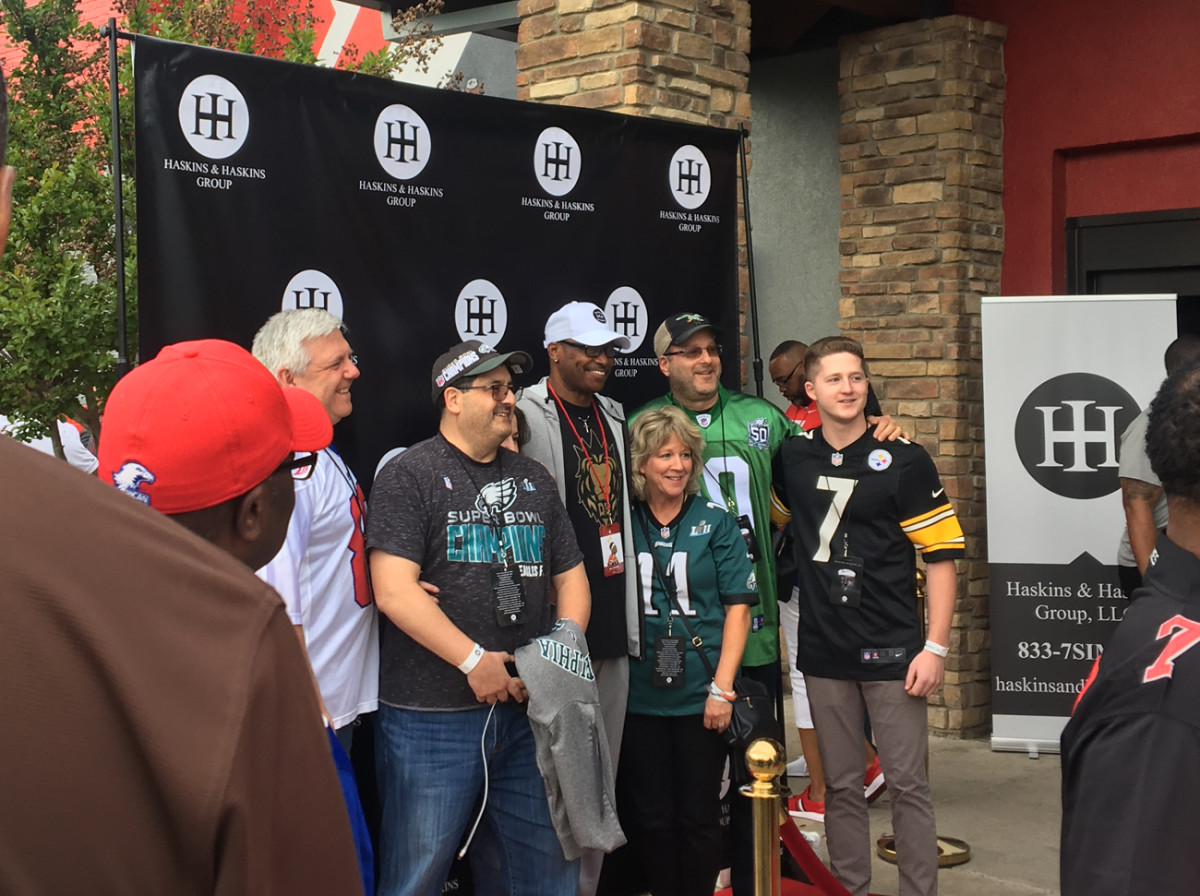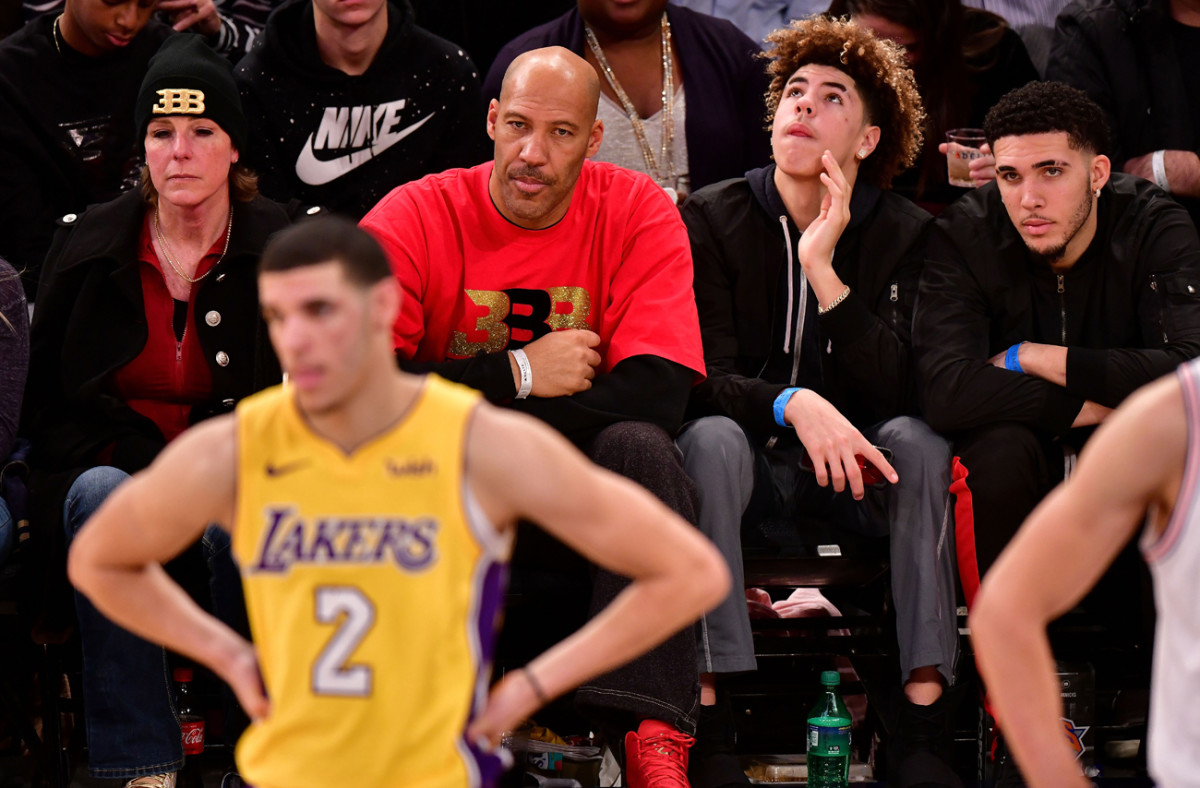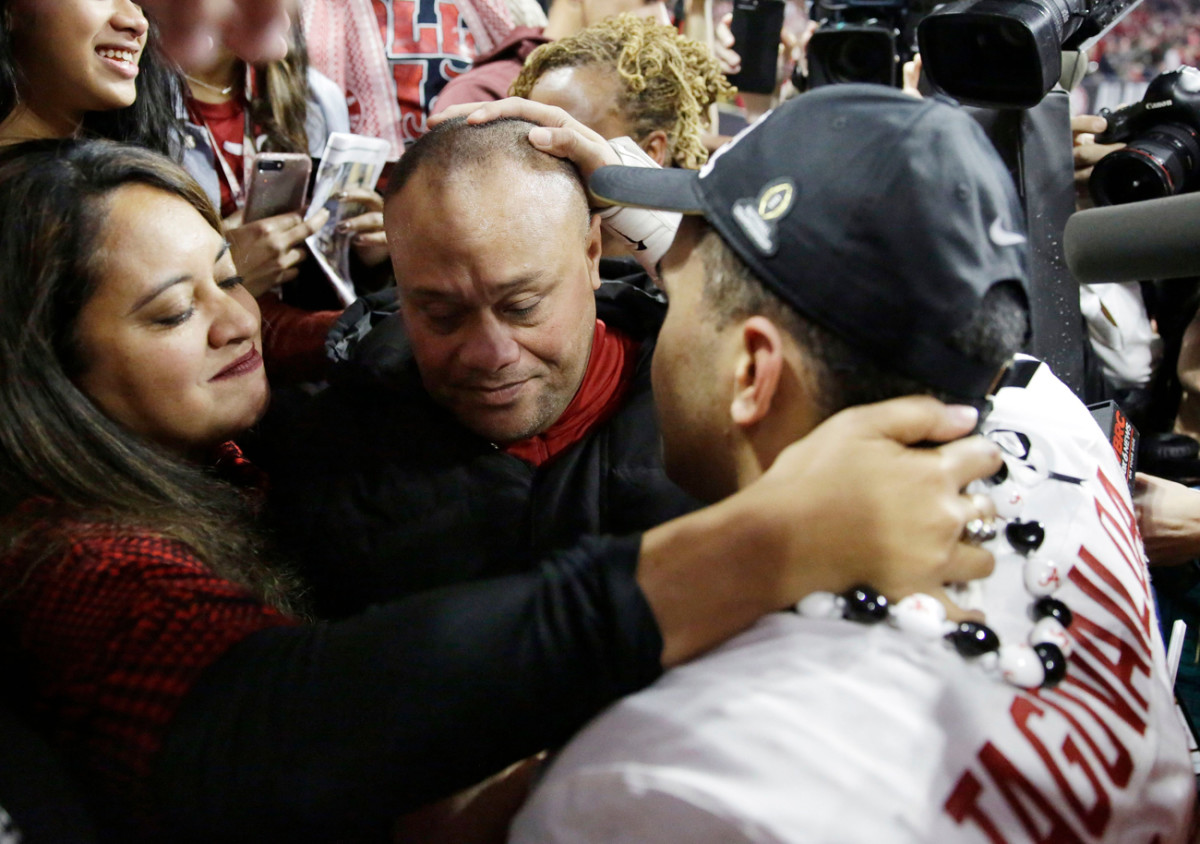The Rise of the Snowplow Sports Parents

This story appears in the June 17, 2019, issue of Sports Illustrated. For more great storytelling and in-depth analysis, subscribe to the magazine—and get up to 94% off the cover price. Click here for more.
Arriving at his draft-night party, Dwayne Haskins Jr. steps out of a gray van with a large logo affixed to its side: a black circle with two white H’s that connect in the middle. The Ohio State quarterback makes his way past fans and media down a red carpet, printed with the same logo, and walks under a banner displaying the two H’s. The symbol is everywhere and—to the uninitiated—could be more than a bit confusing: There is, after all, only one Dwayne Haskins about to be drafted. So why two H’s?
As Haskins Jr. wades through 300 of his closest friends and paying customers inside the Bowlmor Lanes in Gaithersburg, Md.—$40 covered bowling, food and drinks—the person responsible for that second h stays attached to his hip. It is his dad.
Dwayne Haskins Sr. has meticulously planned the draft-night event not just to launch his son’s career but also to launch their new family endeavor: Haskins & Haskins Group, LLC, an entertainment, branding and event agency that he registered shortly after Junior declared for the NFL draft in January. He has the two-H logo tattooed on the inside of his wrist, as do Dwayne Jr.’s mom, Tamara, and 18-year-old sister, Tamia, an aspiring actor. (The QB plans on getting it later.) The second h technically refers to Tamia, according to Dwayne Sr., but there’s little doubt who the driving force behind the company is.
Haskins Sr., it turns out, is not unique. One NBA agent said two out of his eight clients have their own LLCs to handle marketing and branding opportunities, set up by parents soon after their college careers ended.
And pro sports parents have lately found a range of ways to assert themselves in their children’s careers: Anthony Davis Sr. made headlines when he told ESPN he doesn’t want his son to play for the Boston Celtics. Galu and Diane Tagovailoa uprooted their family from Hawaii to Tuscaloosa to be closer to their son Tua, Alabama’s quarterback. When two-sport star Kyler Murray appeared on The Dan Patrick Show in February and the host questioned him about whether he’d choose MLB or the NFL, Murray struggled to answer, fidgeted and looked off camera to find his dad, Kevin. Patrick then started addressing questions to the father.
And you know about LaVar Ball.
The overactive parent is as old a concept as sports itself, but coaches and agents across football, basketball, baseball and hockey say that over the last few years, parents have become more involved in their children’s athletic careers than ever before—and it is reshaping sports. After all, this is a burgeoning age of player empowerment. Salaries are higher, athletes can force trades and recruit teammates. Business opportunities are everywhere, from the phones in players’ hands to the shoes on their feet. But that also means there are more complex decisions to make. So parents are stepping in to ensure that not an ounce of potential is wasted.
The phenomenon also reflects what’s happening in the rest of society, says psychologist Madeline Levine, an expert on the topic. “It used to be helicopter parenting,” she says. “And now it is snowplow parenting, which is much more active: It means you are doing something to smooth the way for the child. It’s not just that you’re hypervigilant—it’s that you are actually getting rid of those bumps, which robs kids of the necessary experience of learning and failing.”
Not surprisingly, the trend is driving many coaches nuts. “When I think about my next coaching job, I think it should be in an orphanage,” says Notre Dame basketball coach Mike Brey. “I use that [line] at coaching clinics, and high school coaches give me a standing ovation.”

Call it the age of the sportsplow parent. And as ever, job one is controlling the narrative. On draft night Dwayne Sr. handpicked the media members allowed access. Earlier that afternoon, he had assembled the H&H team over lunch at Red Lobster to go over final details for his staff, mostly family and friends. “Every person that is out in the front or in the lobby, make sure you engage, shake hands and show everybody your pearly-white teeth,” Haskins said as he flashed an exaggerated smile. “Can we all do that? Let’s practice that now.” The precise greeting language is typed up on the meeting’s eight-part agenda: “Welcome to the Haskins family draft party! Dreams do come true!”
One by one, everyone at the table repeated the line.
When Washington picked Haskins Jr. at No. 15, the QB stepped in front of the camera for an interview with ESPN. This was his moment, the one he’d been working toward since he was nine years old. As he started to talk, his dad sidled into the broadcast shot, looming over his shoulder and nodding along in his white H&H cap.
As the fifth-youngest team in the NBA to start this past season, the Phoenix Suns—average age 25.1—sometimes gave the whiff of a youth travel team. Players’ parents had a habit of showing up early to games to watch warmups and on some occasions even sat in on private team workouts and practices.
A spokesperson for the Suns confirmed that parents did sometimes attend practice, though she said it was not frequent. She added that the team opens its arena early on game days, so many fans arrived early. Whether practices are open to guests is at the discretion of the coach, the spokesperson said. Last year that was Igor Kokoskov, who was fired after one season on the job. (He declined comment.) His replacement, Monty Williams, has not yet announced a policy.
One NBA agent says he’s had a parent watch practice only once, in a special situation. “That seems super odd to me,” he says. According to a person familiar with the Suns, parents’ heavy hands had a harmful effect on players, forcing staff to provide constant instruction on basic adult tasks, like setting alarm clocks.
“These guys have so much going in their lives, and they are carrying entire communities,” the person says. “So it is difficult when you can’t just leave that at the door and come to your workplace and just lock in there. Parent involvement at that [pro] level can really stunt a player’s maturity.”
For the most part, agents and coaches are at wit’s end—but too afraid of upsetting parents to ask them to back off. Most sources interviewed for the story were eager to vent, with interviews often turning into impromptu therapy sessions. “I’m just going to start rambling,” said one MLB agent before unburdening himself for an hour. “It’s cathartic for me to talk about it actually.”
Nearly every pro agent has a story. One who works in baseball says a player asked him if he could sue his parents to keep them from coming to his games. There was the mother who was so “addicted to her son’s performance,” in the agent’s words, that he suggested therapy to her. And then the mom who tracked her son’s phone calls on a spreadsheet, in order to keep tabs on how much time he was wasting on the phone and who he was talking to. She even called out the agent once for dialing her son too many times. Why are you bothering him? Did he want to talk to you?
“They start training their kid like an Olympian from age four, and it has really become a full-time job,” the agent says. “When the planets align and you have the crazy parent and you also have the talented child, then you have a professional athlete. That’s it, I’m telling you, [with] like 90% of the players I work with.”

One NHL agent says he’s constantly fielding calls during the season from parents who are convinced their son is going to get traded because they read about it on a blog or Twitter. “Over the last 10 years, it has changed so incredibly,” the agent says. “Now, they have the Internet and all the info that comes with it.”
He recounts an angry call he recently received from a team’s general manager, who had discovered that one of the agent’s players was being privately coached during the season. “What the hell is going on?” the general manager demanded. The agent wasn’t aware, because his client’s parents had made the hire.
“The parents didn’t realize doing this was destructive,” the agent says. “It’s fine to hire a coach in the offseason, but for heaven’s sakes, not during the season, when you have a head coach who provides the player with a role and expects them to play it.”
An NFL agent says he nearly fired a client when the player’s parents hired a private QB coach behind his back to run their son’s pro day. The reputation of the overinvolved quarterback dad is nothing new, but now the phrase is used more frequently to address overinvolved dads of any position. Scouts will ask of a player’s parent, Is he a QB dad?
In truth, QB dads such as Haskins can cost traditional agencies money—perhaps adding to reps’ displeasure—because family companies often split business with them. “There are families working as marketing agencies for their specific children,” one agent says. “As a lot of the marketing and branding has become digital and social, a lot more parents feel as though they are equipped to handle that on their own.”
After the 2015 college football season, a document titled “Jalen Ramsey Pre Draft Package” spread like wildfire throughout NFL agent circles. The memo listed a series of demands for agents interested in representing Ramsey, whom Jacksonville would take with the fifth pick. Jalen’s father, Lamont, says he did not create the document and doesn’t know who did, but the list of asks—which included benefits and business opportunities for both Jalen and his parents—still made the rounds.
Whether or not the memo really came from the Ramseys, it’s most notable that agents had no problem believing it did. “That demand sheet was nothing compared to others I’ve seen,” says one.
Lamont Ramsey, who trains middle and high school athletes as part of a business he started after working with his sons, says that parents have nothing to apologize for when they’re helping their kids—especially when there are so many vultures out there eager to exploit their children and their newfound riches. “I don’t think any parent oversteps, period,” he says. “Most parents are going to have the best interest of their kid at heart. Before Jalen was an NFL player, somebody was sacrificing and doing things to help him get there.”
For young players entering the woolly world of professional sports—and being courted by an endless parade of smooth-talking agents and managers and trainers and financial planners—parents sometimes feel like the only people they can trust. Packers first-round pick Rashan Gary met with a couple of different agencies, but he didn’t feel right about their plans, so the Michigan linebacker decided to start his own business, with his mom, Jennifer Coney-Shepherd, as the president. She designed the logo for Rashan Gary Sports, handles his merchandise sales, manages her son’s schedule and organizes future plans for the agency. “My mom is important to me,” Gary said at his locker at Lambeau Field, a gray RG Sports hoodie hung up on a hook behind him. “There are really no boundaries she could cross. I love making her happy: That’s why I do certain things.”
Lamont Ramsey is right about this: The system by which pro athletes are produced demands more of parents than ever. Young athletes must attend all manner of showcases and camps and secure spots on the right teams—to make sure they get noticed by recruiting websites. Parents fear that if they don’t participate in the rat race, they’ll fail their kids.
Ramsey says he sees the angst in clients’ parents. “In the last few years I’ve noticed more parents are concerned with the rankings than the kids are,” he says. “More parents are acting like they are being recruited than the kids.”

When ESPN college basketball analyst Jay Bilas started his high school basketball camp six years ago, he was shocked by the number of parents who stuck around for all three days of camp. Back when he was a teen, his parents would drop him off, and he wouldn’t see them again until the end of the week. But Bilas found so many parents hanging around that he added programming to keep them busy, so that the kids could have space. His camp now offers presentations and Q&A’s with college coaches, strength and conditioning coaches, and recruiting experts.
For parents who successfully navigate their kids to coveted college scholarships, involvement often doesn’t end at the campus gates. Recruiting directors for two major college football programs say that in the last 10 years, it has become normal for two or three sets of parents in every recruiting class to pick up and move to town. College basketball coaches are noticing the same trend. “It’s not a lot,” says one former recruiting director, “but it never really happened before.”
College coaches and recruiting directors say that in recent years they’ve had to place more emphasis on re-recruiting players every year because many parents will suggest their child transfer if everything isn’t going perfectly. That impulse to constantly intervene to make sure the child is in the best possible position is not unique to sports. “The child’s life is the parent’s life,” says Julie Lythcott-Haims, former dean of freshmen at Stanford and author of How to Raise an Adult. “The parents feel like, What would I do if I wasn’t constantly involved in my kids’ activities? There is no trust in the systems—the parents do not trust that the adults around the child are doing a good job.”
That overinvolvement can seem helpful in the short term, but in the long term it can hold the child back in developing necessary life skills. “When a child is overhelped like this and led down the path of their life, obstacles cleared out of their way, it harms them psychologically,” says Lythcott-Haims. “When you have too much handled for you, the person lacks agency for their life.”
Coaches are increasingly finding ways to deal with greater parent involvement. At Notre Dame, Brey assigns an assistant coach to each set of parents, and they are responsible for checking in with them every two weeks because “even when we have kids on campus, parents can control the vibe and the head and the attitude,” he says.
Many major programs have started football parent leadership committees to help moms and dads feel more connected and relieve some of the burden from the coaching staff of having to constantly communicate with more than 100 sets of parents. One of the first such programs was Football Parents at Ohio State, and other schools came calling for advice on how to replicate that model. The OSU group has parents who serve as president, vice president and secretary to help organize events and travel, with information hosted on their own website.
Agents are also trying to find new ways to cope. Two years ago, hockey agent Allain Roy was flying home with his teenage son after spending several thousand dollars to take him to a weekend baseball showcase to improve his chances of getting a college scholarship. He started wondering, Is this worth the investment? How much is too much involvement? He started typing out his thoughts into a post for his agency’s blog, writing, “As we rush to fix every little blemish in our kids’ lives and try to influence their way to success, we cause more irreparable damage than we know.”
High school camps are also adding curricula for parents to learn how to communicate with college and professional coaches. Meanwhile, coaches are adapting their recruiting pitches to fit the marketing and branding ambition of today’s parents and athletes. “For parents of kids that are trending toward being elite, the reward is unbelievable, with the money, the contracts, the shoe money,” says Brey. “It’s blown parents’ minds more than the kids’ minds how you can really make it financially. What you are having to sell now is, Here is how we are going to help your brand. This is what Notre Dame is going to do for your individual brand.”
Many coaches, like Brey, are setting clear boundaries with parents in order to preserve their sanity. They will not discuss playing time during the season, but they keep the lines of communication open through other coaches on staff. “Instead of complaining about it, I told our staff, We need to manage it,” Brey says. “It is part of the culture now. Manage it.”
Question or comment? Email us at talkback@themmqb.com.
